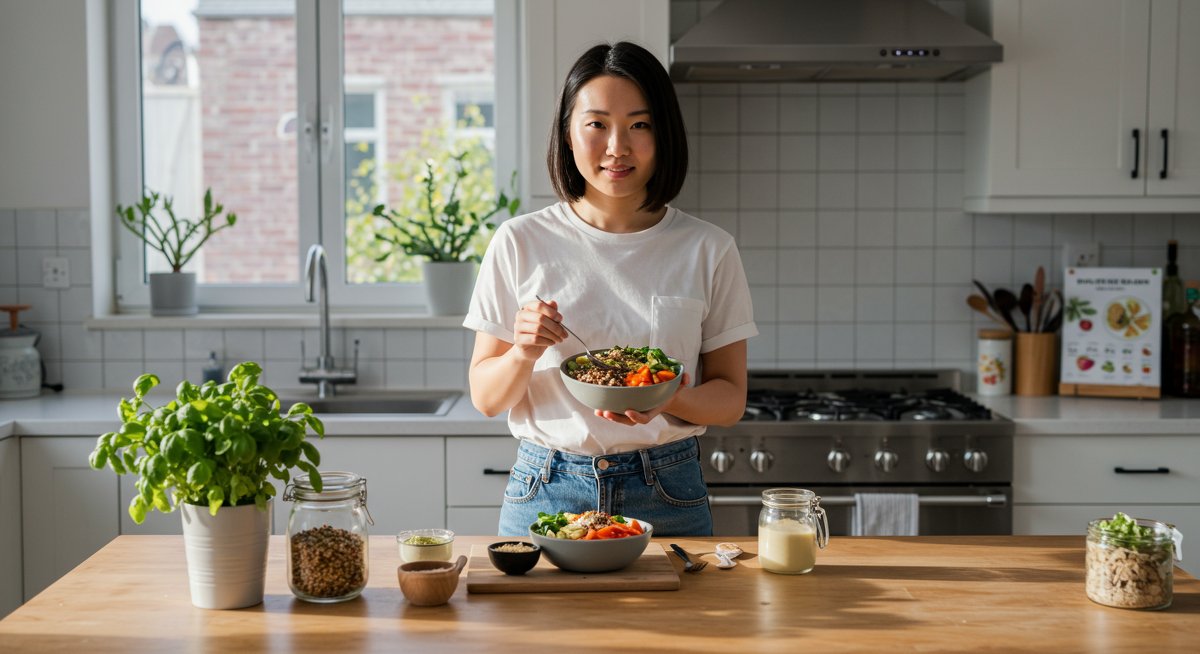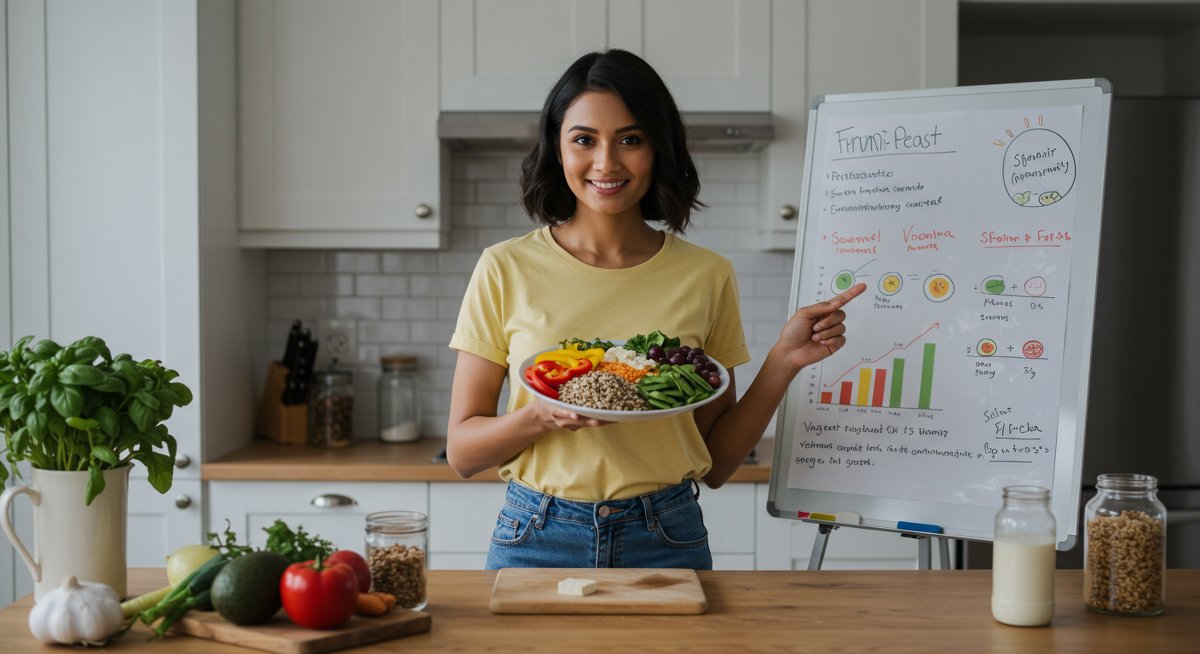Are you new to veganism and wondering how to ensure you're getting all the nutrients your body needs? Embracing a plant-based diet is a great choice for your health and the planet, but it's natural to have questions about nutrition. This guide simplifies vegan nutrition, breaking down the essential vitamins and minerals you need to thrive. We'll explore plant-based sources, address common concerns, and provide practical tips to support your journey. Welcome to a world of vibrant health and delicious food!

Why Embracing Vegan Nutrition Matters on Your Vegan Journey
Starting a vegan lifestyle is exciting, but it's also crucial to understand your nutritional needs. Vegans need to be more mindful of certain nutrients that are primarily found in animal products. By focusing on vegan nutrition, you can prevent deficiencies, boost your energy levels, and feel your best. This isn't just about avoiding meat; it's about making informed choices to fuel your body with everything it requires. A well-planned vegan diet can offer health benefits, including a reduced risk of heart disease, type 2 diabetes, and certain cancers.
For example, consider iron. Iron is essential for carrying oxygen in your blood, and while it's abundant in meat, vegans can easily obtain it from plant-based sources like spinach, lentils, and fortified cereals. However, the type of iron found in plants (non-heme iron) is not as easily absorbed as the heme iron in animal products. We'll cover strategies to enhance iron absorption later in this guide.
Another essential nutrient is vitamin B12, which is almost exclusively found in animal products. Vegans must obtain B12 through fortified foods or supplements. Ignoring this can lead to serious health issues. Understanding the role of B12 and how to supplement is a fundamental aspect of vegan nutrition.
Essential Steps to Get Started
- Educate Yourself: Start by learning about the key nutrients, including protein, iron, calcium, vitamin B12, vitamin D, omega-3 fatty acids, and zinc. Understand their functions and why they are essential for your health. Reliable sources include nutrition guides, registered dietitians, and reputable vegan websites.
- Plan Your Meals: Meal planning is your best friend! Create weekly meal plans that include a variety of plant-based foods. Aim for a colorful plate that includes fruits, vegetables, legumes, whole grains, nuts, and seeds.
- Read Food Labels: Become a label detective. Pay attention to the nutritional information on food packaging to ensure you are meeting your daily needs for each nutrient. Look for fortified foods that provide essential vitamins and minerals, especially vitamin B12.
Example:
- Vitamin B12 Supplementation: A new vegan might start by taking a daily B12 supplement (25-100 mcg) or a weekly dose (1000-2000 mcg), following the advice of a healthcare professional. This simple step ensures adequate B12 intake.
- Iron-Rich Meals: Incorporate iron-rich foods like lentils and spinach into your daily meals. Cook spinach with a squeeze of lemon juice to enhance iron absorption. Pair lentils with foods rich in Vitamin C, such as bell peppers, to maximize iron uptake.
- Omega-3 Sources: Include flaxseeds, chia seeds, and walnuts in your diet to get omega-3 fatty acids. These can be added to breakfast cereals, smoothies, or salads, making it easy to integrate them into your meals.
Common Beginner Questions Answered
- Where do Vegans get Protein? Protein is plentiful in plant-based sources like lentils, chickpeas, tofu, tempeh, quinoa, nuts, and seeds. A balanced vegan diet provides enough protein to meet your daily needs.
- How do I get Vitamin B12? Vitamin B12 is primarily found in fortified foods (nutritional yeast, plant-based milk) or supplements. A daily supplement is often recommended.
- Is a Vegan Diet Expensive? A vegan diet can be budget-friendly. Staple foods like beans, rice, oats, and seasonal vegetables are inexpensive and nutritious.
Tips for Success
- Meal Prep: Dedicate a few hours each week to meal prep. This can involve cooking grains, chopping vegetables, and preparing ingredients for quick meals throughout the week. Prepping meals saves time and ensures you have healthy options readily available, reducing the temptation to make less nutritious choices.
Example:
Meal Prep: On Sundays, cook a large batch of quinoa and roast a tray of vegetables (broccoli, bell peppers, and onions). Store these in separate containers in the fridge, and use them as the base for quick lunches and dinners throughout the week. Add beans, tofu, or a flavorful dressing to complete the meal.
Label Reading: Become a pro at reading food labels. Check serving sizes, and pay close attention to the amounts of vitamins, minerals, and other nutrients. Look for added sugars and unhealthy fats to make informed choices.
Supplement Wisely: While a well-planned vegan diet should provide most of your nutritional needs, certain supplements may be necessary. Discuss your diet with a healthcare professional or registered dietitian to determine if any supplements are right for you.
Nutritional Considerations for New Vegans
Vitamin B12: Essential for nerve function and red blood cell formation. Vegans must supplement or consume fortified foods. A deficiency can lead to fatigue, nerve damage, and anemia.
Iron: Crucial for carrying oxygen. Vegans can obtain iron from plant-based sources but need to be mindful of absorption.
Calcium: Important for bone health. Find it in fortified plant-based milks, tofu (calcium-set), leafy greens, and supplements.
Vitamin D: Essential for calcium absorption and bone health. Sun exposure is a natural source, but supplementation is often necessary, especially in areas with less sunlight.
Omega-3 Fatty Acids: Important for brain health. Vegans should include flaxseeds, chia seeds, and walnuts. Supplementation with algae-based omega-3 may also be beneficial.
Zinc: Vital for immune function and wound healing. Found in beans, nuts, seeds, and whole grains. Absorption can be enhanced by soaking beans and grains.

Finding Community and Support
Joining a vegan community or online group can provide support. Connect with other vegans, share recipes, and ask questions. This can help you stay motivated and learn from others' experiences. Here are a few benefits of joining a community:
- Share Recipes: Exchange new and innovative plant-based recipes.
- Support: A source of support and guidance.
- Stay Informed: Up-to-date on nutritional information.
Quick & Easy Vegan Swaps
- Dairy Milk to Plant-Based Milk: Swap dairy milk for soy, almond, oat, or other plant-based milk. Choose fortified varieties to ensure adequate vitamin B12 and calcium intake.
- Meat to Plant-Based Proteins: Substitute meat with tofu, tempeh, lentils, or black beans. These are versatile ingredients that can be used in various dishes.
- Eggs to Flax Eggs: Use flax eggs (1 tablespoon ground flaxseed + 3 tablespoons water) as a binder in baking.
- Cheese to Vegan Cheese: Replace dairy cheese with vegan cheese made from nuts, soy, or other plant-based ingredients. Experiment with different brands to find your favorites.
Next Steps in Your Vegan Lifestyle
- Consult a Professional: Consider consulting a registered dietitian or healthcare professional with experience in vegan nutrition. They can help you personalize your diet and address any specific nutritional concerns.
- Track Your Intake: Use a food tracking app or journal to monitor your nutrient intake. This can help you identify any gaps in your diet and make adjustments as needed.
- Explore New Recipes: Keep experimenting with new recipes and ingredients. This will keep your meals exciting and ensure you are getting a variety of nutrients.
- Stay Informed: Keep up-to-date on the latest research and recommendations in vegan nutrition. Attend workshops, read books, and follow reliable online sources.